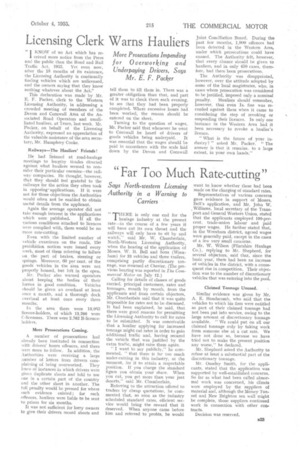"Far Too Much Rate-cutting"
Page 37

If you've noticed an error in this article please click here to report it so we can fix it.
Says North-western Licensing Authority in a Warning to 'Carriers
" 'THERE is only one end for the
1 haulage industry at the present rate—in the course of a few years it will have cut its own throat and the railways will only have to sit by and watch," said Mr. W. Chamberlain, North-Western Licensing Authority, when the hearing of the application of Messrs. W. B. Bell and Sons (Wrexham) for 33 vehicles and three trailers, comprising partly discretionary tonnage, was resumed at Chester. (The previous bearing was reported in The Commercial Motor on July /2.)
Calling for details of classes of goods carried, principal customers, rates and tonnages, month by month, from the applicants and from certain objectors, Mr. Chamberlain said that it was quite impossible for rates not to be discussed. It had been explained, he said, that there were good reasons for permitting the Licensing Authority to call for rates to be submitted. It was conceivable that a haulier applying for increased tonnage might cut rates in order to gain additional traffic and, having secured the vehicle that was justified by the extra traffic, might raise them again.
"I want to say publicly," he commented, " that there is far too much under-cutting in this industry, at the moment, for it to attain a respectable position. If you charge the standard figure you obtain your share, When you cut, you get more than your just deserts," said Mr. Chamberlain.
Referring to the attraction offered to traders by cheap quotations, he commented that, so soon as the industry scheduled standard rates, efficient service would bring the reward that it deserved. When anyone came before him and referred to profits, he would want to know whether these had been made on the charging of standard rates.
Representatives of various concerns gave evidence in support of Messrs. Bell's application, and Mr. John W. , Williams, local secretary of the Transport and General Workers Union, stated that the applicants employed 100-percent, trade-union labour and paid proper wages. He further stated that, in the Wrexham district, agreed wages were generally paid, except in the cases of a few very small concerns.
Mr. W. Wilson (Flintshire Haulage Co.), replying to Mr. Shepherd, for several objectors, said that, since the basic year, theee had been an increase of vehicles in the district, with a consequent rise in competition. Their objection was to the number of discretionary vehicles that was entering into the pool.
Claimed Tonnage Unused.
Similar evidence was given by Mr. A. E. Handscomb, who said that the vehicles to which his firm were entitled as part of their claimed tonnage had not been put into service, owing to the large amount of discretionary tonnage available. "We could put on all our claimed tonnage only by taking work from someone else at a cut rate. We have not done so, because we have tried not to make the present position any worse," he declared.
Mr. Shepherd asked the Authority to refuse at least a substantial part of the discretionary tonnage.
Mr. Ouseley Smith, for the applicants, stated that the application was supported by well-established concerns. So far as what had been called abnormal work was concerned, his clients were employed by the suppliers of material and, although the Mersey 'Funnel and New Brighton sea wall might be complete, those suppliers continued work in connection with other contracts.
Decision was reserved.




























































































